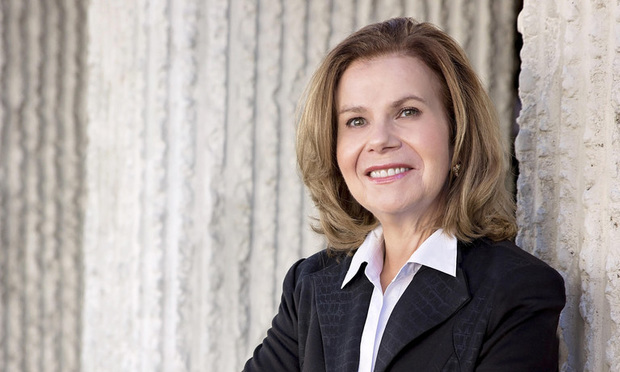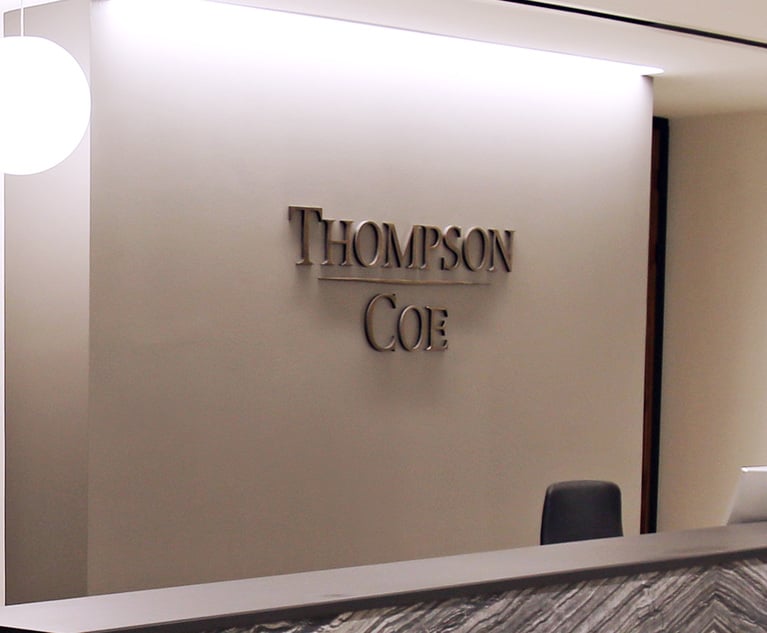Divorced Parents Sharing Custody of Children Facing Uncharted Waters in Pandemic
The Texas Supreme Court has provided some assistance by publishing an emergency order instructing parents sharing custody to stick to the original agreement as much as possible, as though schools were still in regular session.
March 26, 2020 at 10:04 PM
7 minute read
 Susan Myres, president of American Academy of Matrimonial Lawyers.
Susan Myres, president of American Academy of Matrimonial Lawyers.
Divorced and separated parents often put many hours of effort into designing a shared custody plan that parents and children can accept. Now we are experiencing a pandemic that creates an entirely unprecedented challenge to all of those careful arrangements.
The Texas Supreme Court has provided some assistance by publishing an emergency order instructing parents sharing custody to stick to the original agreement as much as possible, as though schools were still in regular session. For example, if the parent is supposed to pick up the child after school, but the school building is closed, the parents may have to agree on another location but the time for the pickup should theoretically stay the same.
Many Texas orders contain a provision that, if the child is not "in school," then the drop-off or pickup will occur at 6 p.m. at a parent's residence. Robust agreements provide for a variety of contingencies, but no one could have predicted the impact of COVID-19 on our parenting plans.
The Supreme Court order is helpful guidance for the majority of our parents who have figured out how to successfully navigate their family dynamics without the need to rigidly follow their divorce decree. But it is a blunt tool when parents may need to work out myriad unanticipated difficulties and realistic fears with a range of more creative options.
It is, however, a starting point. Particularly if custody arrangements were hard fought to begin with, it's best to work within the existing framework as much as is humanly possible, with safety guidelines in place. Interpersonal dynamics did not evaporate when the divorce decree was signed, and it is not unreasonable to simply follow the terms of the order, if at all possible, rather than engage in incessant negotiations that generate harsh feelings.
On the other hand, it would be foolish to try to function as if nothing has changed or will change. Parents may have planned a spring vacation trip that entailed flying or long-distance driving to some far-flung destination. Now that kind of travel is inadvisable, if not forbidden. Destinations such as amusement parks, museums and entertainment venues are closed, so the point of making the trip may have vanished anyway. Choices of where to spend time together in general are much diminished. Traditions like seeing the child for a few hours at a favorite fast-food restaurant are now impossible.
Some parents may have planned to take a child to visit grandparents who live far away. Forgoing that visit will be particularly disappointing, but, according to COVID-19 guidelines, older adults are more susceptible to the virus and should not be receiving visitors.
In addition, parents involved in essential services such as health care, the manufacture of desperately needed health equipment or the administration of unemployment benefits may suddenly be working long hours and extra shifts. Other parents may have been furloughed entirely or be working on reduced pay and can no longer even afford to take the child on a promised vacation. Individual home environments may be compromised if elderly adults are being cared for.
The question every parent sharing possession of a child, who cannot maintain the court-ordered schedule, should be ready to answer when all this is over is, "What steps did you take to afford the other parent meaningful connections to the child during this period?" It's very important to enable the child to maintain contact with the parent (and grandparents) who are now not going to get to see the child.
This is where creativity comes into play. The child can, for instance, share books, movies or games with the absent relatives, along with lots of FaceTime or Skype. Online games can be shared. Old-fashioned games like checkers and chess can also be shared if there are boards in each location.
Both parents can help with homework. (One of the funnier memes on the internet postulated that the vaccine for COVID-19 would be invented by parents trying to home-school their children for more than a week.) Rigid time limits on communications should be relaxed to make virtual contact work. Some children don't communicate meaningfully by phone. Parents will need to find other creative ways for parent and child to relate.
New York Gov. Andrew Cuomo mentioned in a news conference that he had had some of the best and deepest conversations he ever had with his daughter while she was self-isolating at home for two weeks. Sometimes unexpected down time can bring families closer, even if they aren't physically together, because they have time to pay attention to each other.
It's equally important for the parent who has the child to be generous in arranging makeup time with the other parent when the crisis has passed. Family law judges expect parents to make reasonable accommodations when they can be made and will take seriously concerns raised in later filings about parents who are inflexible in these highly unusual circumstances. But demanding to have the child for the entire summer to make up for time lost now is probably not a reasonable accommodation.
Perhaps the most critical admonition of all is that parents must share information with each other if a child has been exposed to someone who has tested positive for the virus, or if the child is exhibiting any of the symptoms of the virus. Whatever their other disagreements, parents should work hard on reaching agreement as to how each will protect the child from exposure. The disaster we now face is much bigger than difficulties with relationships.
Another major consideration will be the issue of child support. There is no doubt that the pandemic will pose an economic hardship and lead to lost earnings for many, many parents, both those who are paying child support and those who are receiving child support. The parent who is paying should try to provide something, even if it can't be the full amount. The parent who is receiving payments should try to be accommodating under these challenging and temporary circumstances. Long-term unemployment will warrant modification of child support.
Adversity can become an opportunity for parents to come together and focus on what is best for the child. For many children, the strange days of the pandemic will leave vivid memories. How their parents reacted will be a core memory for all of our children, impacting them long after the ugly blanket of COVID-19 has been lifted. It's imperative for every child to know and remember that both parents, and other responsible adults, did everything they could to explain what was happening and to keep their child safe.
Susan Myres is a board-certified family law attorney at Myres & Associates PLLC. She has been practicing in Houston for over 35 years and has served in leadership positions locally, statewide and nationally. She is also the current president of the American Academy of Matrimonial Lawyers (AAML).
This content has been archived. It is available through our partners, LexisNexis® and Bloomberg Law.
To view this content, please continue to their sites.
Not a Lexis Subscriber?
Subscribe Now
Not a Bloomberg Law Subscriber?
Subscribe Now
NOT FOR REPRINT
© 2025 ALM Global, LLC, All Rights Reserved. Request academic re-use from www.copyright.com. All other uses, submit a request to [email protected]. For more information visit Asset & Logo Licensing.
You Might Like
View All


Eversheds Sutherland Adds Hunton Andrews Energy Lawyer With Cross-Border Experience
3 minute read
Ex-Marathon General Counsel Takes Legal Reins of Another Energy Company
Trending Stories
- 1'It's Not Going to Be Pretty': PayPal, Capital One Face Novel Class Actions Over 'Poaching' Commissions Owed Influencers
- 211th Circuit Rejects Trump's Emergency Request as DOJ Prepares to Release Special Counsel's Final Report
- 3Supreme Court Takes Up Challenge to ACA Task Force
- 4'Tragedy of Unspeakable Proportions:' Could Edison, DWP, Face Lawsuits Over LA Wildfires?
- 5Meta Pulls Plug on DEI Programs
Who Got The Work
Michael G. Bongiorno, Andrew Scott Dulberg and Elizabeth E. Driscoll from Wilmer Cutler Pickering Hale and Dorr have stepped in to represent Symbotic Inc., an A.I.-enabled technology platform that focuses on increasing supply chain efficiency, and other defendants in a pending shareholder derivative lawsuit. The case, filed Oct. 2 in Massachusetts District Court by the Brown Law Firm on behalf of Stephen Austen, accuses certain officers and directors of misleading investors in regard to Symbotic's potential for margin growth by failing to disclose that the company was not equipped to timely deploy its systems or manage expenses through project delays. The case, assigned to U.S. District Judge Nathaniel M. Gorton, is 1:24-cv-12522, Austen v. Cohen et al.
Who Got The Work
Edmund Polubinski and Marie Killmond of Davis Polk & Wardwell have entered appearances for data platform software development company MongoDB and other defendants in a pending shareholder derivative lawsuit. The action, filed Oct. 7 in New York Southern District Court by the Brown Law Firm, accuses the company's directors and/or officers of falsely expressing confidence in the company’s restructuring of its sales incentive plan and downplaying the severity of decreases in its upfront commitments. The case is 1:24-cv-07594, Roy v. Ittycheria et al.
Who Got The Work
Amy O. Bruchs and Kurt F. Ellison of Michael Best & Friedrich have entered appearances for Epic Systems Corp. in a pending employment discrimination lawsuit. The suit was filed Sept. 7 in Wisconsin Western District Court by Levine Eisberner LLC and Siri & Glimstad on behalf of a project manager who claims that he was wrongfully terminated after applying for a religious exemption to the defendant's COVID-19 vaccine mandate. The case, assigned to U.S. Magistrate Judge Anita Marie Boor, is 3:24-cv-00630, Secker, Nathan v. Epic Systems Corporation.
Who Got The Work
David X. Sullivan, Thomas J. Finn and Gregory A. Hall from McCarter & English have entered appearances for Sunrun Installation Services in a pending civil rights lawsuit. The complaint was filed Sept. 4 in Connecticut District Court by attorney Robert M. Berke on behalf of former employee George Edward Steins, who was arrested and charged with employing an unregistered home improvement salesperson. The complaint alleges that had Sunrun informed the Connecticut Department of Consumer Protection that the plaintiff's employment had ended in 2017 and that he no longer held Sunrun's home improvement contractor license, he would not have been hit with charges, which were dismissed in May 2024. The case, assigned to U.S. District Judge Jeffrey A. Meyer, is 3:24-cv-01423, Steins v. Sunrun, Inc. et al.
Who Got The Work
Greenberg Traurig shareholder Joshua L. Raskin has entered an appearance for boohoo.com UK Ltd. in a pending patent infringement lawsuit. The suit, filed Sept. 3 in Texas Eastern District Court by Rozier Hardt McDonough on behalf of Alto Dynamics, asserts five patents related to an online shopping platform. The case, assigned to U.S. District Judge Rodney Gilstrap, is 2:24-cv-00719, Alto Dynamics, LLC v. boohoo.com UK Limited.
Featured Firms
Law Offices of Gary Martin Hays & Associates, P.C.
(470) 294-1674
Law Offices of Mark E. Salomone
(857) 444-6468
Smith & Hassler
(713) 739-1250






